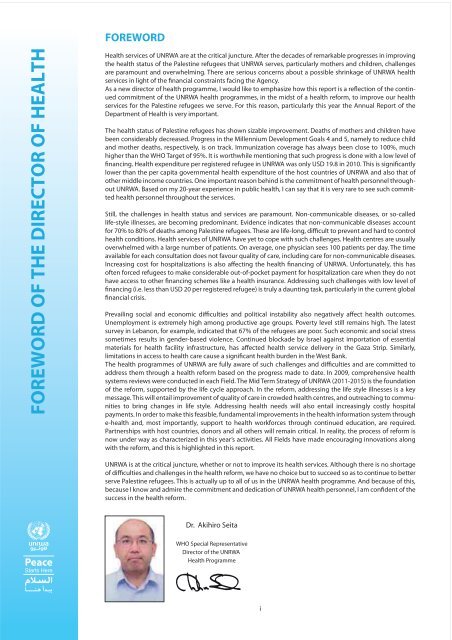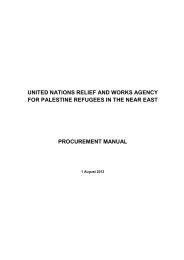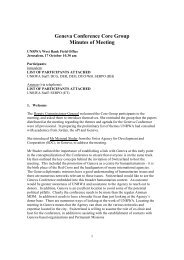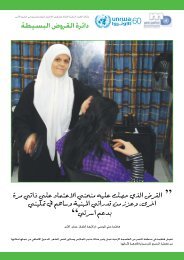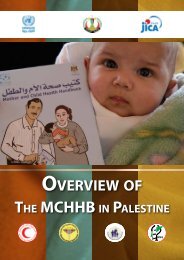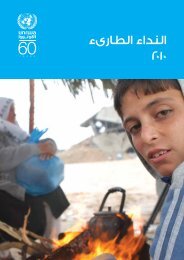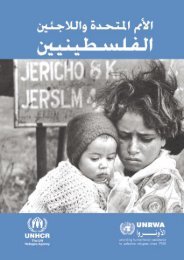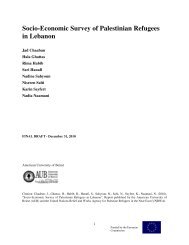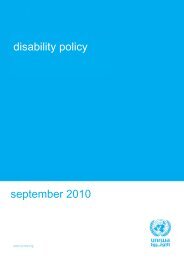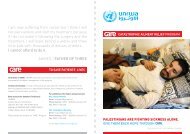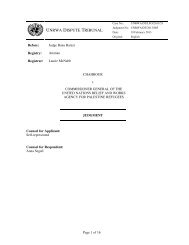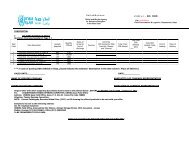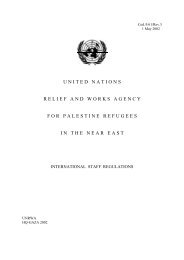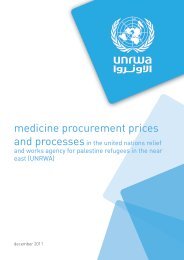Annual Report of the Department of Health 2010 - Unrwa
Annual Report of the Department of Health 2010 - Unrwa
Annual Report of the Department of Health 2010 - Unrwa
You also want an ePaper? Increase the reach of your titles
YUMPU automatically turns print PDFs into web optimized ePapers that Google loves.
FOREWORD<br />
FOREWORD OF THE DIRECTOR OF HEALTH<br />
<strong>Health</strong> services <strong>of</strong> UNRWA are at <strong>the</strong> critical juncture. After <strong>the</strong> decades <strong>of</strong> remarkable progresses in improving<br />
<strong>the</strong> health status <strong>of</strong> <strong>the</strong> Palestine refugees that UNRWA serves, particularly mo<strong>the</strong>rs and children, challenges<br />
are paramount and overwhelming. There are serious concerns about a possible shrinkage <strong>of</strong> UNRWA health<br />
services in light <strong>of</strong> <strong>the</strong> financial constraints facing <strong>the</strong> Agency.<br />
As a new director <strong>of</strong> health programme, I would like to emphasize how this report is a reflection <strong>of</strong> <strong>the</strong> continued<br />
commitment <strong>of</strong> <strong>the</strong> UNRWA health programmes, in <strong>the</strong> midst <strong>of</strong> a health reform, to improve our health<br />
services for <strong>the</strong> Palestine refugees we serve. For this reason, particularly this year <strong>the</strong> <strong>Annual</strong> <strong>Report</strong> <strong>of</strong> <strong>the</strong><br />
<strong>Department</strong> <strong>of</strong> <strong>Health</strong> is very important.<br />
The health status <strong>of</strong> Palestine refugees has shown sizable improvement. Deaths <strong>of</strong> mo<strong>the</strong>rs and children have<br />
been considerably decreased. Progress in <strong>the</strong> Millennium Development Goals 4 and 5, namely to reduce child<br />
and mo<strong>the</strong>r deaths, respectively, is on track. Immunization coverage has always been close to 100%, much<br />
higher than <strong>the</strong> WHO Target <strong>of</strong> 95%. It is worthwhile mentioning that such progress is done with a low level <strong>of</strong><br />
financing. <strong>Health</strong> expenditure per registered refugee in UNRWA was only USD 19.8 in <strong>2010</strong>. This is significantly<br />
lower than <strong>the</strong> per capita governmental health expenditure <strong>of</strong> <strong>the</strong> host countries <strong>of</strong> UNRWA and also that <strong>of</strong><br />
o<strong>the</strong>r middle income countries. One important reason behind is <strong>the</strong> commitment <strong>of</strong> health personnel throughout<br />
UNRWA. Based on my 20-year experience in public health, I can say that it is very rare to see such committed<br />
health personnel throughout <strong>the</strong> services.<br />
Still, <strong>the</strong> challenges in health status and services are paramount. Non-communicable diseases, or so-called<br />
life-style illnesses, are becoming predominant. Evidence indicates that non-communicable diseases account<br />
for 70% to 80% <strong>of</strong> deaths among Palestine refugees. These are life-long, difficult to prevent and hard to control<br />
health conditions. <strong>Health</strong> services <strong>of</strong> UNRWA have yet to cope with such challenges. <strong>Health</strong> centres are usually<br />
overwhelmed with a large number <strong>of</strong> patients. On average, one physician sees 100 patients per day. The time<br />
available for each consultation does not favour quality <strong>of</strong> care, including care for non-communicable diseases.<br />
Increasing cost for hospitalizations is also affecting <strong>the</strong> health financing <strong>of</strong> UNRWA. Unfortunately, this has<br />
<strong>of</strong>ten forced refugees to make considerable out-<strong>of</strong>-pocket payment for hospitalization care when <strong>the</strong>y do not<br />
have access to o<strong>the</strong>r financing schemes like a health insurance. Addressing such challenges with low level <strong>of</strong><br />
financing (i.e. less than USD 20 per registered refugee) is truly a daunting task, particularly in <strong>the</strong> current global<br />
financial crisis.<br />
Prevailing social and economic difficulties and political instability also negatively affect health outcomes.<br />
Unemployment is extremely high among productive age groups. Poverty level still remains high. The latest<br />
survey in Lebanon, for example, indicated that 67% <strong>of</strong> <strong>the</strong> refugees are poor. Such economic and social stress<br />
sometimes results in gender-based violence. Continued blockade by Israel against importation <strong>of</strong> essential<br />
materials for health facility infrastructure, has affected health service delivery in <strong>the</strong> Gaza Strip. Similarly,<br />
limitations in access to health care cause a significant health burden in <strong>the</strong> West Bank.<br />
The health programmes <strong>of</strong> UNRWA are fully aware <strong>of</strong> such challenges and difficulties and are committed to<br />
address <strong>the</strong>m through a health reform based on <strong>the</strong> progress made to date. In 2009, comprehensive health<br />
systems reviews were conducted in each Field. The Mid Term Strategy <strong>of</strong> UNRWA (2011-2015) is <strong>the</strong> foundation<br />
<strong>of</strong> <strong>the</strong> reform, supported by <strong>the</strong> life cycle approach. In <strong>the</strong> reform, addressing <strong>the</strong> life style illnesses is a key<br />
message. This will entail improvement <strong>of</strong> quality <strong>of</strong> care in crowded health centres, and outreaching to communities<br />
to bring changes in life style. Addressing health needs will also entail increasingly costly hospital<br />
payments. In order to make this feasible, fundamental improvements in <strong>the</strong> health information system through<br />
e-health and, most importantly, support to health workforces through continued education, are required.<br />
Partnerships with host countries, donors and all o<strong>the</strong>rs will remain critical. In reality, <strong>the</strong> process <strong>of</strong> reform is<br />
now under way as characterized in this year’s activities. All Fields have made encouraging innovations along<br />
with <strong>the</strong> reform, and this is highlighted in this report.<br />
UNRWA is at <strong>the</strong> critical juncture, whe<strong>the</strong>r or not to improve its health services. Although <strong>the</strong>re is no shortage<br />
<strong>of</strong> difficulties and challenges in <strong>the</strong> health reform, we have no choice but to succeed so as to continue to better<br />
serve Palestine refugees. This is actually up to all <strong>of</strong> us in <strong>the</strong> UNRWA health programme. And because <strong>of</strong> this,<br />
because I know and admire <strong>the</strong> commitment and dedication <strong>of</strong> UNRWA health personnel, I am confident <strong>of</strong> <strong>the</strong><br />
success in <strong>the</strong> health reform.<br />
Dr. Akihiro Seita<br />
WHO Special Representative<br />
Director <strong>of</strong> <strong>the</strong> UNRWA<br />
<strong>Health</strong> Programme<br />
i


